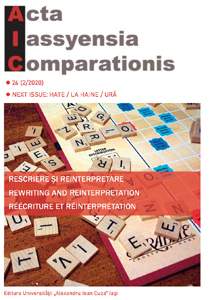Goethe entmythisiert. Urfaust in Friedrich Dürrenmatts Regievision
Goethe Demythified. Urfaust in Friedrich Dürrenmatt’s Vision as a Director
Author(s): Dragoş CaraseviciSubject(s): Theatre, Dance, Performing Arts, Studies of Literature
Published by: Editura Universităţii »Alexandru Ioan Cuza« din Iaşi
Keywords: Friedrich Dürrenmatt; J.W. Goethe; Urfaust; reception of the classics; Bertolt Brecht; textual adaptation; directorial concept;
Summary/Abstract: Friedrich Dürrenmatt’s choice to adapt and stage Urfaust is partly grounded on his wish to demythify Goethe and implicitly the entire Faust. Initially planned for Basel, this production will be carried out by the Swiss playwright at Schauspielhaus Zürich in 1970. Unlike his adaptations in Basel, in Urfaust Dürrenmatt leaves the text almost untouched and focuses rather on some structure alterations and especially on the insertions from the folk book about Doktor Faustus – undoubtedly the most important novelty the textual adaptation brings in. However, the idea of using the old folk book does not belong to Dürrenmatt, but proceeds from Brecht and the function of these insertions must also be understood in Brechtian terms, that is, as epic theatre. Nevertheless, the directing principles of this production are not totally influenced by Brecht, but become distinct from his production in Potsdam (1952), on the one hand by highlighting the “ballad-like” specificity of Urfaust, and, on the other hand by using an uncommon cast: an old man (the not rejuvenated Faust) seduces a young maiden – a grotesque idea in itself. The main dramaturgical means of the Dürrenmattian concept of comedy become now the main means of the director Dürrenmatt.
Journal: Acta Iassyensia Comparationis
- Issue Year: 2/2020
- Issue No: 26
- Page Range: 1-7
- Page Count: 7
- Language: German

